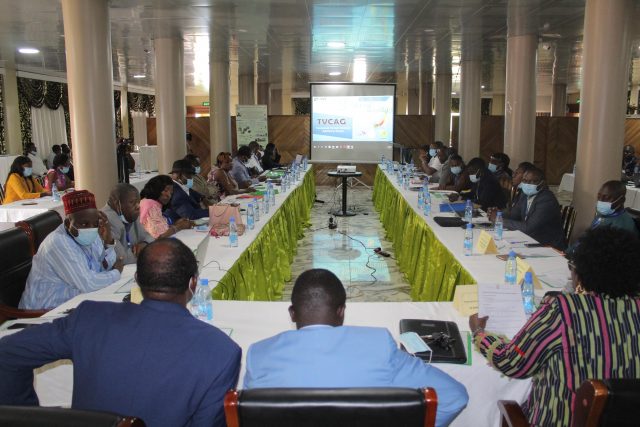The 3 rd meeting of the Technical Vector Control Advisory Group (TVCAG) was held on April 13, 2022, at United Hotel, Mbankomo, Centre Region, Cameroon. A total of 45 stakeholders attended this meeting.

Stakeholders interacting during the meeting
On April 13, 2022, the 3rd TVCAG meeting was held at the United Hotel, Mbankomo, Centre Region. It brought together various stakeholders including representatives of the Ministry of Public Health, Ministry of Livestock Fishery and Animal Industries, Ministry of Environment, Protection of Nature and Sustainable Development, Ministry of Scientific Research and Innovation, representatives from national control diseases programs including Malaria, Onchocerciasis, Filariasis, Human African Trypanosomiasis, researchers from the Centre for Research in Infectious Diseases (CRID), OCEAC (Organisation de Coordination pour la lutte contre les Endemies en Afrique Centrale ), CRFilMT (Centre de Recherche sur les Filariases et autres Maladies Tropicales) and some state universities. A total of 45 stakeholders attended the TVCAG 2022 annual meeting. CRID’s Executive Director, Prof Charles Wondji in his welcoming allocution emphasised on the fact that, this meeting aims at sharing evidence from works conducted on vector borne diseases in Cameroon and to discuss the way forward for TVCAG, whose primary goal is to propose, through quality research, reliable evidence to the Ministry of Health that will help adjust control responses or strategies against vector borne diseases.
The meeting started with an introductive session moderated by Prof Epee Emilienne. During this part, six presentations were made. Following this, were four scientific sessions held under 14 thematic areas with 20 scientific presentations. During this meeting, stakeholders assessed the progress made in the control of vector-borne diseases in Cameroon. They shared findings and evidence generated by projects launched under PIIVeC including Operational Research Projects and other projects conducted by Research Career Development Fellows. Thereafter, recommendations were formulated to improve the control of vector borne diseases in Cameroon as well as a discussion on the sustainability of TVCAG.
Closing remarks were done by Mr NGU Paul NEMBO, DROSS representative. On behalf of the Minister of Public Health, he acknowledged the high quality of evidences generated by the Partnership for Increasing the Impact of Vector Control (PIIVEC) and efforts done by the TVCAG. He thanked the heads of the different programs for the work done towards meeting the objectives set on vector borne disease control. Concerning the issue of TVCAG sustainability, he assured the hierarchy will be informed about the work that is being carryout and the need to consider working with local councils and regions. Mr NGU ended his speech by thanking the British High Commissioner and the Liverpool School of Tropical Medicine for their commitment in supporting the Ministry, wishing that they continue in this line.






